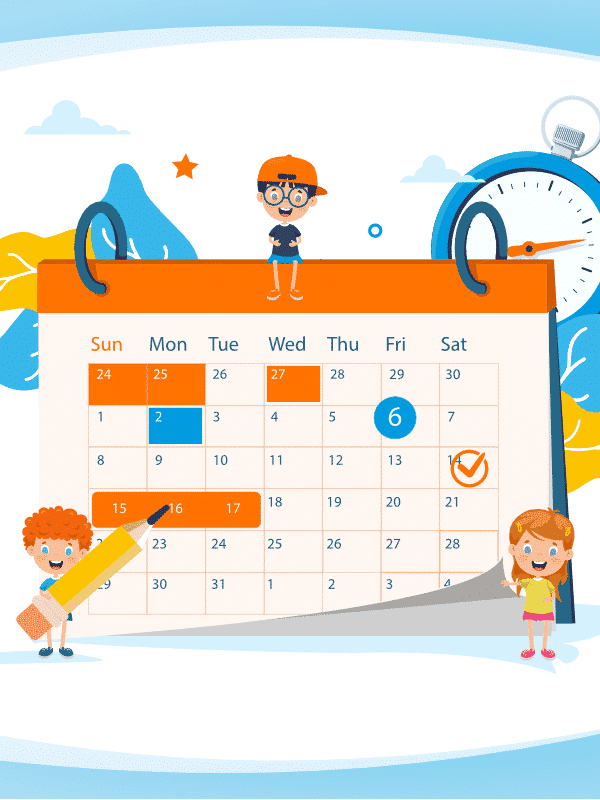Entertaining children can be very difficult. They need to play, coexist and learn new things while interacting with each other. Though we understand how tiring and difficult this can be, as kids lose interest very quickly.
That’s why you must keep them engaged with incredibly fun activities and games, preferably one that keeps them moving.
“Jugaremos en el bosque” is a fun game that many Hispanic kids have played through the years. And adults nowadays treasure with love the moments when they used to play it during playtime. Kids would laugh, run, and have much fun.
So, if you’re looking for a fun way to entertain your kids or students, “Jugaremos en el bosque” is a great option. The best thing is that they will not just have a good time but will also acquire Spanish as a second language. There’s nothing better for a kid than learning while having fun.
What Will this Game Do for Your Kids?
Fun and stress relief.
It’s a great game with which they’ll spend a good amount of time just having fun with fellow classmates and friends. Every child needs a moment like this to keep their minds off homework and school, relax and just be kids.
Make friends.
This game involves many kids, the more the better. So, maybe your kids will have to play with other children they don’t know. But a fun game like this one always helps break the ice.So, they might end up with many new friends and better socializing skills. Who knows, maybe one of those friends will be a native Spanish speaker!
Get tired!
Sometimes kids have way too much energy, and so you need a special activity where they can get rid of that. Because if not, they can get too distracted, run around the house all the time, and be awake and ready to pay at nighttime. And you and your kid also need peaceful time.
So, playing a game like this will help them get a bit more tired, so when night comes, they actually feel like resting. By teaching them this game you will teach them how to waste their energy in a good way.
Improve their Spanish!
I know, we just said that this game is perfect to forget about school for a second. But this is also the perfect game to learn Spanish without noticing. After all, it would be like learning through immersion. This means involving the target language in everyday activities, like playing games.
So, make your kids play this game in Spanish and use at least some words in this language. You’ll notice that they’ll acquire Spanish vocabulary and won’t even notice it. It’s all the contrary to the boring method of memorizing words for an exam. So, even when they’re learning, this game is still stress free.
Feel close to new cultures.
This game is very popular in different Latin American countries; many kids have grown up playing it. So, if your kids play it to learn the language, they’ll also learn about new cultures.
After all, what a kid plays and what he/she grows up loving is a huge part of a country’s culture and ways of living. Your children will feel a bit closer to Latin American people by playing this traditional Hispanic game.
How to Play
One kid will be the lobo (wolf). The rest of the kids will grab each other by the hands and form one circle. The lobo will be in the center of the circle.
The other kids will start singing about how they’ll play in the woods while the wolf is not there. Every two verses they’ll ask the wolf if he’s there. And the wolf will answer with some excuse or thing he’s doing that doesn’t let him be there yet.
Until one time, when the kids ask, the wolf will say he’s ready. The kids will break the circle and run while the wolf chases them. Whoever is caught by the wolf is the new wolf.
The wolf can make all the excuses he wants and take all the time he wants to be ready. The point is to catch the kids off guard.
Sometimes the wolf will even play a bit with the kids’ mind. He can do this by giving answers like: “I’m picking up my keys” or “I’m tying my shoes”. So, children will feel nervous because he’s almost ready, but not quite there yet; they’ll be in suspense.
The song is a classic of this game, so here it is for your kids to learn it in Spanish:
Jugaremos en el bosque mientras el lobo no está,
porque si el lobo aparece, el lobo nos comerá.
Lobo, ¿estás ahí?
(The wolf answers with an excuse) No, me estoy bañando.
Jugaremos en el bosque mientras el lobo no está,
porque si el lobo aparece, el lobo nos comerá.
Lobo, ¿estás ahí?
(The wolf answers with another excuse) No, me estoy vistiendo.
Jugaremos en el bosque mientras el lobo no está,
porque si el lobo aparece, el lobo nos comerá.
Lobo, ¿estás ahí?
(Another excuse) No, estoy desayunando.
Jugaremos en el bosque mientras el lobo no está,
porque si el lobo aparece, el lobo nos comerá.
Lobo, ¿estás ahí?
¡Sí! (The wolf starts chasing them)
Some people also sing “juguemos en el bosque”, instead of “jugaremos en el bosque”, but it means the same thing. The first one is “let’s play in the woods”; the second one is “we will play in the woods”.
Here’s a translation of what the verses say in English:
We will play in the woods while the wolf is not here,
because if the wolf appears, the wolf will eat us.
Wolf, are you there?
Spanish Phrases for the Game
Here are a few phrases in Spanish for the lobo to use as answers to the “¿Lobo, estás ahí?” question. These are things that the wolf could be doing that stops him from being there yet. All answers start with a “no” at the beginning to say that he’s not there yet, because he’s doing this other thing.
- Estoy haciendo/tendiendo la cama / I’m making the bed
- Me estoy bañando / I’m taking a shower
- Me estoy vistiendo / I’m getting dressed
- Estoy cocinando / I’m cooking
- Estoy desayunando / I’m getting breakfast
- Me estoy lavando/cepillando los dientes / I’m brushing my teeth
- Estoy lavando los trastes / I’m washing the dishes
- Estoy barriendo / I’m sweeping
- Estoy viendo TV / I’m watching TV
- Me estoy amarrando los zapatos / I’m tying my shoes
- Estoy buscando las llaves / I’m looking for the keys
- Estoy agarrando las llaves / I’m taking the keys
Remember: these phrases are just options; the kid that plays the wolf can invent his/her own excuses/answers. But, whatever the case, encourage your kids to say any expressions they want in Spanish, so they practice their language skills.
If your children are basic Spanish learners, they might find it easier to use the phrases above. Plus, they’ll help them improve their vocabulary a lot. Because they contain basic verbs in Spanish that we all use on an everyday basis.
Can Kids Master the Spanish Language Just with Games?
We’ve explained to you that playing games in Spanish is great for kids to improve and learn. That it is part of the immersion method to learn languages. But it doesn’t mean that kids will be fluent in Spanish just by playing. Games are a complement to other ways of learning, including Spanish classes.
And yes, you might be thinking that classes are not usually very joyful for children. But if you enroll them in a school that uses the immersion method, then they will enjoy learning. Because believe it or not, the immersion method is not just for games: it can also be implemented in classrooms. In fact, that is the way we teach here at TruFluency Kids.
Our immersion method means that our native teachers will always speak in Spanish at all times. So kids will start to pick up the language from an early age. We will also teach them all aspects of the language: reading, listening, speaking, grammar. But we will do it in an entertaining way, through songs, dancing, cooking, games and more.
We will also give kids time to speak in every class. So, they can start practicing their Spanish conversation skills. Practice is the best way of achieving Spanish fluency. So, yes, playing games is a great way of learning, but it’s just one part of a whole studying method.
If you want to see your kids learning in many different fun ways, check out our Spanish classes. And sign up for our next four-week session.


